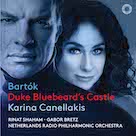

Karina Canellakis, Netherlands Radio Philharmonic Orchestra: Bartók:
Duke Bluebeard's Castle
Pentatone
The first recording one obtains of a seminal work becomes an understandable benchmark against which others are measured. So it is with Béla Bartók's opera Duke Bluebeard's Castle, created by the composer and librettist Béla Balázs between 1911 and 1918. Of the many recordings available, the one that introduced me to the work is the version recorded in 1979 featuring the great Dietrich Fischer-Dieskau as Bluebeard and the equally great Julia Varady as Judith, with Wolfgang Sawallisch conducting the Bavarian State Orchestra. The coupling of those vocal legends with the nuanced artistry of Sawallisch and company makes for an interpretation that ranks high. Of course there are many others from which to choose, including ones by Ormandy, Kubelik, Boulez, Haitink, and Kertész, and different listeners will argue for their favourites for any number of reasons.
Drenched in atmosphere and texture, Bartók's opera has more in common with Debussy's Pelléas et Mélisande than The Magic Flute or The Rake's Progress, and his masterful exercise in tone painting and mood building remains gripping a century after its creation. So what argues in this latest treatment's favour? Given the terrific, Grammy-nominated recording of Bartók's Concerto for Orchestra Karina Canellakis issued with the Netherlands Radio Philharmonic Orchestra for Pentatone in 2023, the orchestra's Chief Conductor is becoming something of a Bartók expert. Her rendition is nuanced, and the recording quality and production values top-notch. In its favour too is the inclusion of the spoken prelude, which primes us for the story to come and which not every version includes. Mezzo-soprano Rinat Shaham (Judith) and bass-baritone Gabor Bretz (Bluebeard) distinguish their parts, sung in Hungarian, with emotionally invested performances, and the NRPO is splendid. Bartók's score is, of course, magnificent and the orchestration masterful, its impact never greater than when each of the doors is opened and a brilliant new sound world released. It doesn't hurt either that its story, about a man whose former wives are locked within his gloomy castle of horrors and who's attempting to lure another to the same fate, captivates from start to finish. Last but not least, the work's succinct, single-act design is easy to embrace when multi-act others require two to three hours at a time.
After the thought-provoking, scene-setting prologue (“The curtain of our eyelids is raised: Where is the stage: outside or within, Ladies and gentlemen?”), the cryptic work advances methodically from one bolted door to the next until the devastating reveal of the final one. The work's intoxicating spell is cast the moment strings and woodwinds join the speaker two minutes in and set the stage for the singers' entrance. The emotional intensity of their initial exchanges anticipates the harrowing extremes to come, and the dread-filled music reinforces the character of their anguished to-and-fro. Even after the first door's torture chamber contents—shackles, daggers, blood-stained walls, et al.—are revealed, Judith is adamant that every door be opened to let healthy air flow through them. After the second's armoury of blood-stained battle weaponry makes clear Bluebeard's capacity for cruelty, the third and fourth reveal his vast wealth and his castle's secret garden, with Bartók's score reinforcing the tonal character of each blood-soaked unveiling. Eventually the opening of the fifth reveals the vastness of Bluebeard's kingdom, the moment accompanied by an explosive climax and majestic music befitting the epic sight. Judith's demand that the last two doors be opened are initially met with resistance, but after the Duke gradually succumbs, the penultimate one reveals his unearthly lake of tears and, with the tension mounting almost unbearably, the seventh the wrenching sight of his former wives. In keeping with its despairing tone, the opera ends with Judith taking her part alongside the others and Bluebeard resignedly intoning, “Henceforth all shall be darkness, darkness, darkness.”
Is this iteration from Canellakis and the NRPO superior to those that came before? Arguably not, though it is without question a thoroughly credible presentation that more than holds its own, and much the same could be said about Shaham and Bretz, who are wholly convincing in their roles. Perhaps more than anything else, this latest treatment speaks to the continuing vitality of Bartók's creation and its continuing capacity for casting audiences under its spell.April 2025